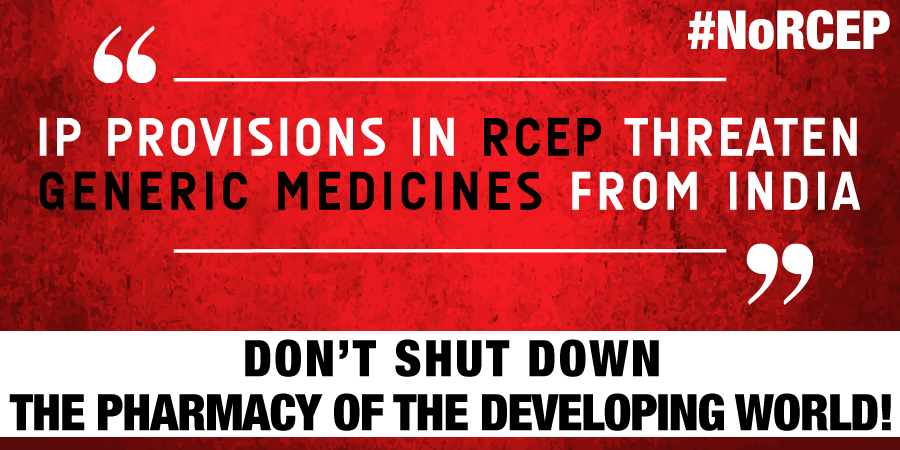Trade deals putting health at risk
Bangkok Post | 20 July 2018
Trade deals putting health at risk
by Leena Menghaney
Leena Menghaney is Head of Medecins Sans Frontieres’ Access Campaign in South Asia.
The 23rd round of negotiations on the Regional Comprehensive Economic Partnership (RCEP) agreement taking place this and next week in Bangkok — between 10 Asean countries and their trading partners : Korea, Japan, China, India, Australia and New Zealand — include talks on an intellectual property rights chapter which directly impacts access to affordable medicines.
A leaked draft of the negotiating text has revealed some proposed harmful intellectual property provisions that could undermine access to price-lowering, generic medicines, and thus, life-saving treatment to millions of people not just in RCEP countries but potentially across the globe.
Globally, the high price of new lifesaving medicines, ranging from US$100,000 per person for cancer treatment to $1,000 per pill for treatment for hepatitis C, is putting increasing financial pressure on people, their governments and healthcare systems.
High prices come from monopolies that are granted to pharmaceutical corporations, blocking competitors from entering the market. Pharmaceutical monopolies are restricting people’s access to treatment across the developing world, and now even in high-income countries, they undermine people’s right to health and universal healthcare.
Undoubtedly, the medical advances of the last century — with major contributions from public funds and research institutions — have led to the development of breakthrough medicines that have helped control many epidemics and saved millions of lives.
A case in point is the development of anti-retroviral drugs, which have helped contain HIV and prolonged the lives of people living with the virus. Today, nearly 21 million people living with HIV are on treatment — a global accomplishment that was possible because generic manufacturers in countries like Thailand and India were able to produce easy-to-use affordable combination drugs. Prices proceeded to tumble by more than 99% with increased market competition, from $10,000 for one person’s treatment per year, to a dollar a day, and now under $100 per year.
As treatment providers, we at Médecins Sans Frontières (MSF) rely on affordable generic medicines from India and elsewhere to do our daily work.
India has long been called the "pharmacy of the developing world", supplying affordable generic versions of medicines patented elsewhere, where people cannot afford them. But this model is under threat. Big pharma from the US, Switzerland, the EU and Japan are lobbying hard to make sure affordable generics don’t compete with their own high-priced drugs.
The monopoly-based intellectual property system keeps newer life-saving medicines out of reach for people who need them. Some examples are newer hepatitis C drugs, newer vaccines, drugs to treat drug-resistant tuberculosis and cancer, and biological medicines. Today, for instance, the high price of the patented vaccine against pneumonia — the world’s leading killer of children under five — is hampering roll out in a number of immunisation programmes.
These pharmaceutical corporations are now using trade deals to further compound this situation to ensure more restrictions on generic competition. RCEP is one such trade agreement being negotiated among 16 countries which are home to nearly half of the world’s population, including the most impoverished, vulnerable and marginalised communities.
The harmful measures on intellectual property proposed by Japan and South Korea in this trade deal could have detrimental effects on generic competition and potentially keep prices of newer medicines higher. They go well beyond what the World Trade Organisation requires and will create a new standard for intellectual property that will create multiple entry barriers to accessing affordable medicines for the world’s poor.
While the world is already grappling with high prices of medicines, any new measures and policies introduced in developing countries under such intellectual property provisions of this RCEP trade deal will further restrict generic competition and will have a direct impact on universal health care.
For decades, Asean countries, in their sovereign capacity and collectively, have balanced intellectual property with access to treatment despite immense pressure from the corporate pharma lobby.
In fact, many of these countries have championed the use of public health safeguards enshrined in international trade rules, including "compulsory licensing" to introduce affordable generic versions of lifesaving medicines. Compulsory licences in Thailand, Indonesia and Malaysia — for HIV, cancer and hepatitis C medicines — have brought their prices down exponentially, making it possible for governments to roll out treatment for these diseases as part of public health programmes.
Malaysia, with a burden of nearly 500,000 people affected with hepatitis C, was lauded last year for issuing a "government use" licence to allow imports of generic versions of the oral hepatitis C drug sofosbuvir. This cut the price from $71,300 to $237 per person for three months of treatment, enabling universal scale up of treatment.
International trade rules allow governments to use flexibilities and safeguards in the interest of public health, and using them can save millions of lives. But reserving this ability means Asean needs to stand strong in the RCEP negotiations against Japan and South Korea, and not trade away health.






